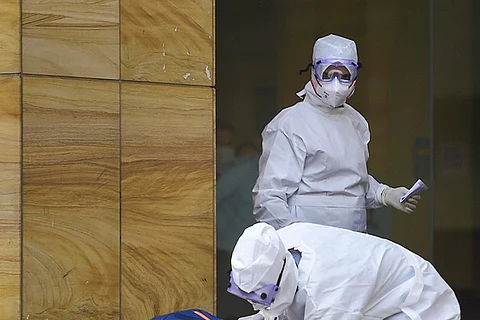

With a spike in the number of COVID-19 cases in Kerala, the state government has prepared an emergency plan - Plan C - to meet any unprecedented situations.
Within two days, March 20 and 21, the state reported 24 COVID-19 cases, taking the total count of people under treatment to 49. The possibility of a community outbreak, which is being anticipated by the Kerala government, has made the health department prepare Plan C.
In Plan C, 3,028 isolation beds will be set up at 122 hospitals across the state including 81 government and 41 private hospitals.
The health department has already identified the hospitals which will be used for implementing the plan. The non-emergency departments in such hospitals will be cleared and facilities for setting up isolation beds will be done. About 218 beds in Intensive Care Units have also been set up as part of Plan B and C.
The state government started to prepare Plan C after a three member family who came from Italy, and their two acquaintances in Pathanamthitta, had tested positive for the disease on March 8.
“If the public become cautious and follow social distancing, we can fight off COVID-19 in Plan B itself. But if a community spread arises and more cases get reported, we will go to Plan C,” said KK Shailaja, Minister for Health, in a statement on Sunday.
Out of the 18 committees formed by the health department to coordinate the preventive measures, the Infrastructure Committee and Private Hospital Co-ordination Committee deals with the process of setting up the isolation beds. Only those who are directly admitted to the hospitals (on arrival to the state) and those in home quarantine who start to show symptoms will be treated in isolation rooms. The plans were prepared considering this in mind. The number of medical staff, medicine, safety equipment and ventilator facilities is also being increased as per the plans.
By the last week of January, when the coronavirus disease first came to Kerala with three students returning from Wuhan in China testing positive, the state government had prepared Plan A and Plan B. Plan A was immediately put in place with 50 government hospitals and two private hospitals prepared to admit the patients. At least 974 isolation beds were made ready and an additional 242 beds were identified to use in case it was needed. These preparations proved to be effective as all the three patients had recovered in time and did not pass on the disease to another person.
In plan B, 71 government hospitals and 55 private hospitals were ready to deal with COVID-19. The number of isolation beds rose to 1408 and an additional 17 beds were identified for future use.
As of now it is plan A that is being implemented. Since nearly a thousand beds are included as part of the plan and that many patients have not yet tested positive for the disease, the need to switch to plan B has not yet risen.
Corona care centres
At least 147 corona care centres have already been opened in the state to accommodate those foreigners and people from other districts, who don't have a place to stay while under observation. At present only a few cases are accommodated in such centres. But if there arises a community spread, such facilities can be used as isolation rooms. They can accommodate at least 21,866 persons simultaneously.
Prohibitory orders in Kozhikode
Meanwhile, prohibitory orders were imposed in Kozhikode district Sunday night in an effort to contain the spread of novel coronavirus and to effectively impose social-distancing measures, District Collector Sambasiva Rao said.
The prohibitory orders under section 144 of the CrPC came into effect from 9 PM banning assembly of any kind for demonstrations, processions or protests.
Any gathering -- social, cultural, political, religious, academic, sports, seminar or conference -- is also not allowed, the order stated.
No shops and establishments other than those selling vegetables, fruits and essential commodities should be opened. These shops and medical stores would remain open from 10 a.m. to 7 p.m, it said.